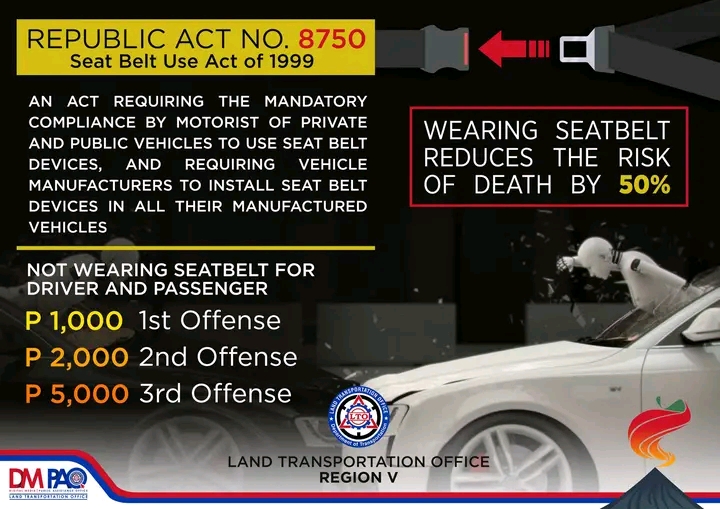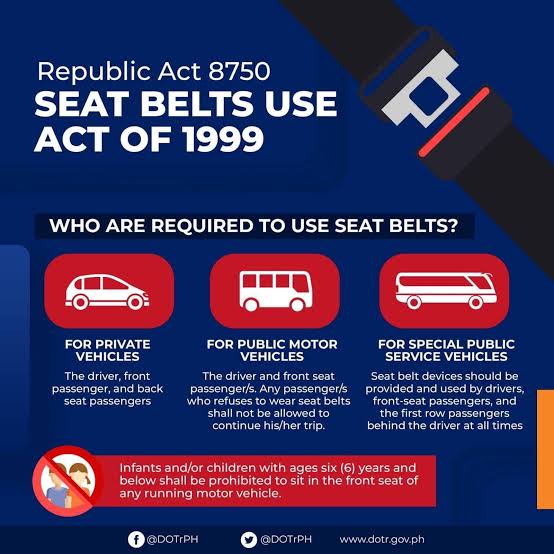Republic Act No. 8750, known as the “Seat Belts Use Act of 1999,” is a Philippine law mandating the use of seat belts for drivers and front seat passengers in all motor vehicles. The law requires vehicle manufacturers to install seat belts in every new vehicle. Its primary aim is to safeguard drivers and passengers from injuries in road accidents.
This law applies to both private and public motor vehicles, ensuring that everyone, especially those in front seats, is protected. It addresses the problem of high injury rates in vehicular crashes by enforcing seat belt use. RA 8750 is necessary because it significantly reduces the risk of severe injuries and fatalities, promoting overall road safety.
What is RA 8750?
RA 8750 refers to the Seat Belts Use Act of 1999—a law that requires all drivers and front seat passengers in private and public vehicles to use seat belts. The law also mandates that vehicle manufacturers install seat belts in all newly manufactured vehicles. The Land Transportation Office (LTO) enforces this law to protect citizens from the harmful effects of vehicular accidents.
It was established to reduce road accident injuries and fatalities in the Philippines, prompted by the high rate of vehicular accidents and the need for a proactive approach to passenger safety. Its history traces back to growing concerns about road safety in the 1990s, leading lawmakers to prioritize preventive measures. Studies showing the effectiveness of seat belts in saving lives influenced its enactment. The law officially took effect in 1999, marking a significant step in enhancing traffic safety regulations in the country.

Key Provisions
Some of the main clauses or rules implemented under this law include the following:
1. Mandatory Use of Seat Belts
RA 8750 outlines who must comply with the seat belt requirements to reduce the risk of injury in vehicular accidents. The law says that following individuals need to wear seat belts to enhance road safety:

- Drivers: All drivers of private and public motor vehicles must wear seat belts while the vehicle is in operation.
- Front Seat Passengers: Passengers seated in the front seat of private and public vehicles are required to wear seat belts at all times.
- Rear Seat Passengers: Passengers seated in the back row, specifically those who are directly behind the driver in private cars, SUVs, and for-hire vehicles, must wear seat belts.
- Public Utility Vehicle Passengers: Front seat passengers in public utility vehicles must wear seat belts, and drivers must ensure compliance.
- Passengers in the front row and those directly behind the driver in private cars, SUVs, and hire vehicles must wear seat belts.
- For-hire vehicles: Drivers must inform and require front seat passengers to wear seat belts and can refuse service if they do not comply.
Note: Passengers who refuse to wear seat belts must take another seat for which a seat belt is not required or be refused to continue his/her trip. They also need to be informed that no insurance can be recovered in case of an accident.
2. Exemptions and Special Cases
Certain individuals and situations are exempt from RA 8750. These includes:
- Passengers or operators with medical conditions preventing them from wearing seat belts are exempt, provided they have certification from a licensed physician explaining why a restraint is inappropriate.
- Passengers in the back seats of certain vehicles like jeeps, vans, and buses are exempt from this requirement.
- Passengers in specific seat types are also not covered by this law. These seats include:
- Folding seats, including those provided in the following places:
- Folding seats at aisles
- Seats in the loading platform
- Those in spaces other than those designed exclusively for installing seats (except those seats in which only the seat-back section can be folded.
- Single-seater chairs that are provided at the side of the driver’s seat of three-wheeled motor vehicles where the rotational angle of the steering wheel or bar is less than seven times the rotational angle of the steering tire.
- Side-facing seats
- Seats in close proximity to emergency exit
- Folding seats, including those provided in the following places:
3. Fines and Penalties
RA 8750 imposes strict fines and penalties to ensure compliance with seat belt use regulations in the Philippines. These penalties are designed to encourage drivers and passengers to wear seat belts and enhance road safety. Here are the fines and penalties associated with violating this law:
- Drivers who fail to wear seat belts or allow a child under six to sit in the front seat will be fined as follows:
- First Offense: ₱1,000.
- Second Offense: The fine increases to ₱2,000 for a second violation of the seat belt law.
- Third and Subsequent Offenses: A fine of ₱5,000 will be imposed, along with a one-week suspension of the driver’s license for repeated offenses.
- Public Utility Vehicle Violations
- Both the driver and operator of public utility vehicles will be fined ₱3,000 for failing to ensure front seat passengers wear seat belts.
- Failure to Post Signage
- Public utility vehicles that do not post the required seat belt signage will also face a fine of ₱3,000.
4. Enforcement
The enforcement and implementation of RA 8750 are carried out by the LTO in the Philippines. The LTO is responsible for imposing fines and penalties on drivers, operators, and vehicle manufacturers who violate the seat belt law. Additionally, the LTO conducts nationwide information campaigns to raise awareness about the importance of seat belt use and ensure compliance with the law.
Importance of Seat Belts
Seat belts play a crucial role in reducing the risk of severe injury or death in a crash. They are considered important part of traveling for the following reasons:
- They distribute the force of a collision across the body’s strongest areas—the chest and pelvis.
- Seat belts also prevent occupants from being thrown against the car’s interior or ejected from the vehicle, making them essential for safety.
Video: Why Wearing Seatbelt is Important
To understand more about the importance of seat belts and RA 8750, watch this informative video from MamiZang Vlog. It explains how seat belts save lives and why following this law is vital for road safety in the Philippines.
Summary
RA 8750, or the Seat Belts Use Act of 1999, is a law implemented in the Philippines that was specifically designed to enhance safety for drivers and passengers on the road. By requiring drivers and front seat passengers to wear seat belts, the law helps reduce injuries and fatalities in accidents. The LTO enforces this law, and non-compliance can lead to significant fines and penalties. Understanding and adhering to RA 8750 is a necessity for drivers’ and passengers’ safety on the road.